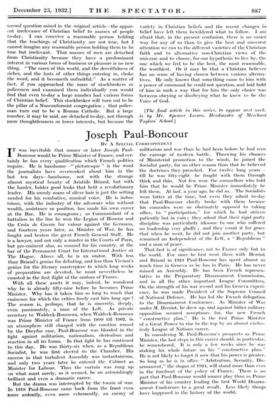Joseph Paul-Boncour
BY A SPECIAL CORRESPONDENT I T was inevitable that sooner or later Joseph Paul- Boncour would be Prime Minister of France, and cer- tainly he has every .qualification which French politics require. He is handsome—" picturesque" is the word the journalists have overworked about him in the last ten days—handsome, not with the strange almost mystical beauty of Aristide Briand, but with the harder, bolder good looks that befit a revolutionary leader. His unruly mane of silver hair is just the setting needed for his combative, musical voice. He is indus- trious, with the industry of the advocate who without wealth, assistance or position, has made his own career at the Bar. He is courageous ; as Commandant of a battalion in the line he won the Legion of Honour and the Croix de Guerre for valour against the Germans, and fourteen years later, as Minister of War, he has fought and beaten the great French General Staff. He is a lawyer, and not only a master in the Courts of Paris, but pre-eminent also, as counsel for his country, at the bar of the Permanent Court for International Justice at The Hague. Above all, he is an orator. With less than Briand's genius for debating, and less than Viviani's genius for the literary masterpiece to which long weeks of preparation are devoted, he must nevertheless be counted in the first flight of the orators of France.
With all these assets it may, indeed, be wondered why he is already fifty-nine before he becomes Prime Minister. Why has it taken him so long to reach that eminence for which the critics freely cast him long ago ? The reason is, perhaps, that he is sincerely, deeply, even passionately, a man of the Left. As private secretary to Waldeck-Rousseau, when Waldeck-Rousseau was Prime Minister of France from 1899 till 1902, in an atmosphere still charged with the emotion roused by the Dreyfus case, Paul-Boncour was blooded in the fight against militarism, nationalism, clericalism and reaction in all its forms. In that fight he has continued to this day. He was thirty-six when, as a Republican Socialist, he was first elected to the Chamber. His success in that turbulent Assembly was instantaneous, and only two years. later he entered the Cabinet as Minister for Labour. Thus the curtain was rung up on what must surely, so it seemed, be an astonishingly brilliant and even a. dramatic career.
But the drama was interrupted by the tocsin of war. In 1919 Paul-Boncour came back from the front even more ardently, even more vehemently, an enemy of militarism and war than he had been before he had seen the carnage of modern battle. Throwing his chances of Ministerial promotion to the winds, he joined the Socialist party, for no other reason than that he believed the doctrines they preached. For twelve long years -- till he was fifty-eight—he fought with them through thick and thin. Not few were the counsellors who told him that he would be Prime Minister immediately he left them. At last, a year ago, he did so. The Socialists were bitter at the time, but even they admit to-day that Paul-Boneour chiefly broke with them because his comrades were so obstinately opposed to taking office, to "participation," for which he had striven patiently but in vain ; they admit that their rigid party discipline was particularly irksome to one who suffered no leadership very gladly ; and they count it for grace that when he went, he did not join another party, but remained an Independent of the Left, a " Republican " and a man of peace.
That fact is of significance, not to France only but to the world. For since he first went there with lIcrriot and Briand in 1924 Paul-Boncour has spent almost as much time in Geneva as he has in Paris. He has never missed an Assembly. He has been French represen- tative in the Preparatory Disarmament Commission, and in all the other important League Committees. On the strength of his war record and his Geneva experi- ence, he was made President of the Supreme Council of National Defence. He has led the French delegation to the Disarmament . Conference. As Minister of War under M. Herriot, he drew up, and against bitter military opposition secured acceptance for, the new French "constructive plan." He is the first Prime Minister of a Great Power to rise to the top by an almost exclus- ively League of Nations career.
In considering M. Paul-Boncour's prospects as Prime Minister, the last steps in this career should, in particular, be remembered. It is only a few weeks since he was staking his whole future on his "constructive plan." He is not likely to forget it now that his power is greater. So long as he is in office "Arbitration, Security, Dis- armament," the slogan of 1924, will stand more than ever in the forefront of the policy of France. There is no part that Paul-Boncour would sooner play than as Prime Minister of his country leading the first World Disarm- ament Conference to a great result. Less likely things have happened in the history of the world.


























 Previous page
Previous page